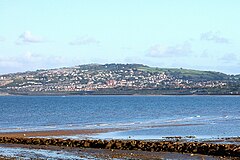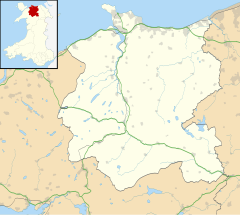Human settlement in Wales
Old Colwyn
| |
|---|---|
 Old Colwyn seen from Rhos-on-Sea Old Colwyn seen from Rhos-on-Sea | |
 | |
| Population | 8,113 (2011) |
| OS grid reference | SH864784 |
| Community |
|
| Principal area | |
| Preserved county | |
| Country | Wales |
| Sovereign state | United Kingdom |
| Post town | COLWYN BAY |
| Postcode district | LL29 |
| Dialling code | 01492 |
| Police | North Wales |
| Fire | North Wales |
| Ambulance | Welsh |
| UK Parliament | |
| Senedd Cymru – Welsh Parliament | |
|
53°17′28″N 3°42′14″W / 53.291°N 3.704°W / 53.291; -3.704  Map of the community | |
Old Colwyn (Welsh: Hen Golwyn, formerly Colwyn bilingually) is a large village just to the east of Colwyn Bay, in Conwy County Borough, Wales.
Prior to local government reorganisation in April 1974 it was part of the Municipal Borough of Colwyn Bay, but the reorganisation established it as a separate community, whose population at the 2001 census was 7,626, increasing to 8,113 at the 2011 census. It hosted the National Eisteddfod in 1941. It also harbours the 3rd Colwyn Bay (Old Colwyn) Scout Group headquarters and is home to the area's comprehensive school, Ysgol Bryn Elian.
Amenities
Old Colwyn has an area of woodland called the 'Fairy Glen'. This area of woodland is said to contain many different spirits including fairies, hence its name, which dates from the Victorian era and is a common name from that period (e.g. the "Fairy Glen" in Penmaenmawr). This area has recently undergone a regeneration with funding from the council and it is now possible to walk through it easily. The Fairy Glen is subject to an ownership dispute between Conwy County Borough Council and the water company, Dŵr Cymru, each claiming that the maintenance of the area is the responsibility of the other.
Old Colwyn was once overlooked by the Hotel 70 Degrees, (just above Tan-y-Lan) so named because the architect who designed it used 70 degree angles in its construction. Built in 1972, it was demolished in 2007, to be replaced by a housing development. It also has easy access onto the promenade and beach, as well as a protruded cliff area known as Penmaenhead, marked by a disused stone utility house. This is a popular spot amongst teenagers for the dangerous practice of "cliff jumping" when tide is in and the water is deep enough, though to date nobody has been hurt.
History
In 1334, the village was mentioned in a government survey as "Coloyne".
In 1685, the village was known as "Colwun" and had a population of twenty.
Following the Census Act 1800, Colwyn had a population of 150 with twenty-three cottages, twelve farms and two inns.
During the nineteenth century, the village of Colwyn became increasingly known as "Old Colwyn" to distinguish it from the newly formed town of Colwyn Bay (initially called "New Colwyn") to the west.
In 1884, Old Colwyn railway station opened (briefly initially named "Colwyn railway station") on the North Wales Coast Line.
In December 1952, the railway station closed; however, both the line and a street called "Station Road" remain.
Since 1984, Colwyn Bay Football Club's ground has been situated on Llanelian Road, Old Colwyn.
Former tramway
The Llandudno and Colwyn Bay Electric Railway operated an electric tramway service between Llandudno and Rhos-on-Sea from 1907 and extended to Colwyn Bay in 1908. The service closed in 1956.
Education
Old Colwyn has one infant school (Ysgol T. Gwyn Jones), one primary school (Ysgol Hen Golwyn), and one secondary school (Ysgol Bryn Elian).
See also
- Borough of Colwyn
- St John the Baptist's Church, Old Colwyn
Notes
- with the exception of a two-year period, 1992–1994, when the Football Association of Wales prohibited their playing games in Wales whilst competing in the English football league system
References
- Office for National Statistics : Census 2001 : Parish Headcounts : Conwy
- "Town population 2011". Retrieved 21 May 2015.
- BBC News - Hotel 70 Degrees
- ^ Colwyn Bay Heritage Online
- A brief history Archived 25 December 2016 at the Wayback Machine Colwyn Bay F.C.
- The Golden Age of Tramways. Published by Taylor and Francis.
External links
- A Vision of Britain Through Time
- British Listed Buildings
- Clwyd Churches
- Geograph
- Office for National Statistics
